GEORGIA COLLEGE & STATE UNIVERSITY Highlights 2022




2 | 2022 GCSU HIGHLIGHTS
Highlights 2022
2022 was a historic year as Georgia College & State University inaugurated Cathy Cox as its 12th president. President Cox challenged the campus community to imagine the future of a contemporary liberal arts university.
The university deepened its commitment to preparing students for successful careers while addressing the workforce needs of Georgia’s vibrant economy.

3 | 2022 GCSU HIGHLIGHTS
Goldwater Scholarship awarded to GCSU student for the first time
Junior biology major Wesley DeMontigny was awarded the Goldwater Scholarship in March — a first for Georgia College & State University.
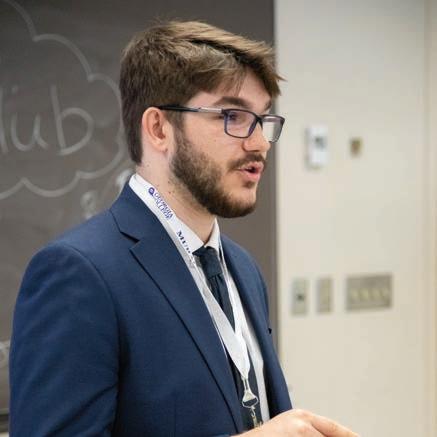
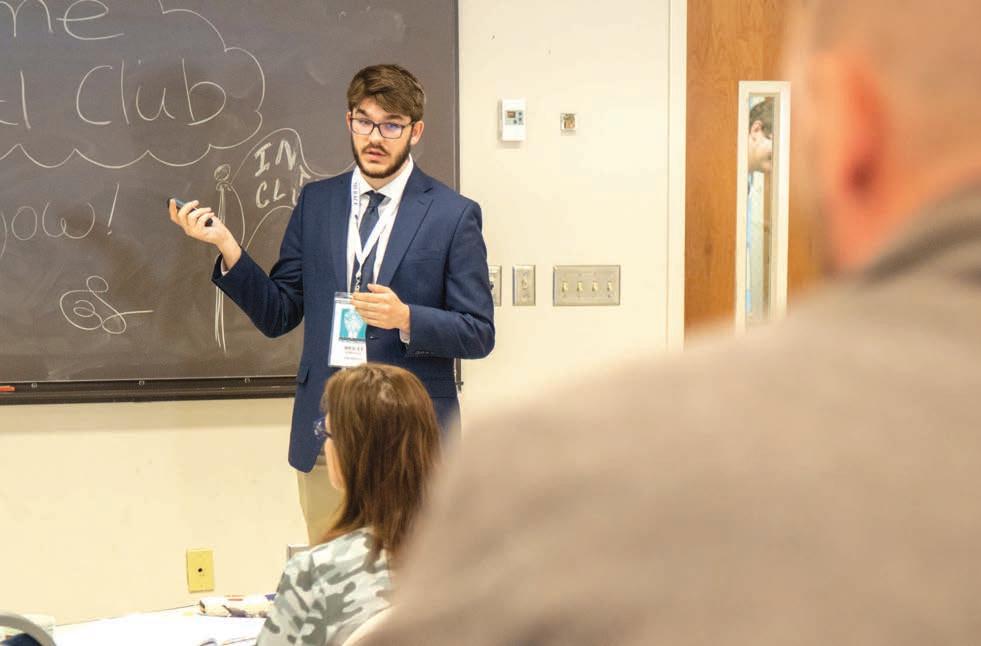
“The Goldwater Scholarship is the nation's foremost award for undergraduates studying the natural sciences, mathematics and engineering,” said Anna Whiteside, assistant director of the Honors College and coordinator for the National Scholarships Office. “To earn this award, recipients must have an extensive research experience in addition to an excellent academic record. Wesley worked very hard on putting this application together, and we are so proud of him.”
The scholarship will provide DeMontigny with $7,500 toward his senior year and hold tremendous power on his curriculum vitae.
His research centers on environmental microbiology.
DeMontigny secured the scholarship with an essay about a project he completed. It explored bacteria that engulf themselves in crystals and the potential applications of that ability.
“I’m interested in using genetic engineering for potential environmental remediation for industrial uses,” he said. “Microbes are fascinating in that they are everywhere, they’ve been around for an extremely long time, and they are the reason we have almost every resource we need to survive.”
Georgia College’s liberal arts approach made his journey possible, he said. If DeMontigny hadn’t been required to take biology, he may not be where he is today.
“If I was in a class of 100 people, getting the professor’s time would be more difficult,” DeMontigny said. “Easily communicating with my professors has been a big deal for both the scholarship and my development as a student.”
Getting the scholarship doesn’t mean DeMontigny is finished. The relief that came with securing the award only lasted four days. After he graduates in the fall, DeMontigny will take an eight-month hiatus, before applying straight into a Ph.D. program.
After he graduated in the fall, DeMontigny embarked on an eightmonth hiatus, before applying straight into a Ph.D. program.
4 | 2022 GCSU HIGHLIGHTS
Sophomore double-major Vivian Cassaniti wins Newman Civic Scholarship

Should you register to vote in your college town or remain registered in your hometown? That’s a question that Student Ambassador and Georgia College & State University tour guide Vivian Cassaniti hears often from students and parents during her tours, and it’s one that Cassaniti is uniquely qualified to answer.
Cassaniti grew up with the news always on in her home, so when she was in high school she had a keen interest in how the news influenced and affected those around her. By the time she got to Georgia College, she’d gathered more course credits than most and rather than graduate early, Cassaniti decided to round out her pre-law degree with a second major in philosophy.
As a student ambassador and member of the mock trial team, her stellar performance soon brought her to the attention of Director of Leadership Programs, Dr. Harold Mock. He nominated her for the 2022 Newman Civic Fellowship, a yearlong program that partners student leaders across the nation for both virtual and in-person networking.
“We appoint a Civic Newman Fellow every year,” Mock said. “Vivian represents the best of Georgia College’s commitment to leadership for the public good. She has delved deeply into the abiding questions of the humanities and social sciences and is using that knowledge to create good on behalf of others and to inform public discourse.”
Cassaniti’s passion for working with local communities to understand different perspectives led her to winning the Newman Civic Fellowship, which selects leaders from Campus Compact member institutions who demonstrate new ways of solving civic issues. As part of the Fellowship, Cassaniti will receive national recognition on the Campus Compact as well as special scholarship opportunities.
“I strive to educate people,” Cassaniti said, “I think it's important that we encourage community engagement and make sure that our leadership and our representatives are, in fact, a representation of the community that they intend to serve.”
Cassaniti sees her receiving of the Newman Fellowship as a time to act.
“I have a real opportunity here to encourage people to get involved in their community, whether that's their college town or their community at home, to familiarize themselves with their local leadership and those municipal governments and understand that you can really make an impact.”
The Newman Fellowship is named for renowned educator Frank Newman, who founded the Campus Compact to help create civically responsible agents of change. The issues that Campus Compact were created to address—at-risk youth and the impact of market forces on education—are uniquely aligned with Cassaniti’s own ambitions.
5 | 2022 GCSU
HIGHLIGHTS
Vivian represents the best of Georgia College’s commitment to leadership for the public good.
– Director of Leadership Programs, Dr. Harold Mock
GCSU student receives selective, national scholarship from Charles Schwab
One of twelve winners nationwide, senior finance and economics double-major Lauren Moskowitz has received Charles Schwab’s Registered Investment Advisor (RIA) Talent Advantage Student Scholarship.

In its second year, the scholarship provides student winners $10,000 for the 2022-2023 academic year and matches them with a senior advisor for mentoring. The scholarship is supposed to decrease financial barriers for students, advocate diversity and widen the talent pool within the RIA industry.
According to Charles Schwab, 586 students across 54 national universities applied this year. The students chosen for the scholarship are vetted by RIA firm leaders serving on Schwab Advisor Services’ Diversity, Equity & Inclusion Advocacy Board.
“I applied not thinking I would get it at all, because it’s 12 people from the entire nation for a massive company,” Moskowitz said. “I go to a small school. We didn’t have a finance major at the time and I just got a scholarship and mentorship program with a dream company.”
She’ll use the scholarship to take the financial burden of expenses off her parents, and complete an independent study with Dr. Isarin Durongkadej, associate professor of finance. She’ll also use it to complete a certificate in Certified Financial Planning. The courses she’s taking will cover topics from estate planning, investments and taxes to basic economic and realworld information.
Upon graduating, Moskowitz has accepted a job offer with Goldman Sachs, which she’ll work for in Atlanta. One day, she hopes to make it to New York City, New York. But Moskowitz couldn’t tell you why she was chosen for the scholarship; her work speaks louder than words.
“I’m very proud of her in many ways. She is a real leader,” said Isarin Durongkadej, assistant professor of finance and a mentor to Moskowitz. “Leadership is a skill that could be hard to build because it requires sacrifice and sympathy. She works hard and understands people around her, and she is always full of energy to learn or try something new.”
6 | 2022 GCSU HIGHLIGHTS
Senior psychology major Anne Elise Beals named Truman Finalist
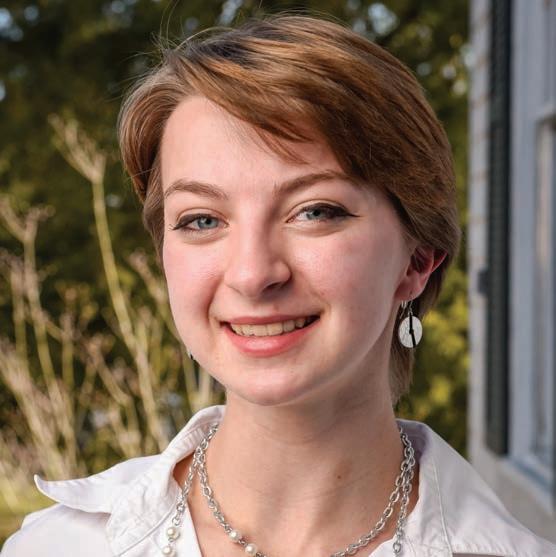
For Anne Elise Beals, service work was never a choice. Rather, it was the chance convergence of a lifetime of interests that lead her to being named a finalist for the Truman Scholarship.
“Being a psychology major,” she said, “and always analyzing the way that people think and why we interact socially the way that we do—it’s that mixed background, that liberal arts education, that’s helped me to combine my interests.”
Beals’ passion for working with LGBTQ+ youth to prevent homelessness and incarceration and her work for the Women’s Center led her to the attention of her philosophy professor, Dr. James Winchester, who suggested she might be a good candidate for the Truman Scholarship. None of this was in the plan. Beals credits the work of her non-biological Aunt Beth for inspiring her to pursue public service.
“We met her when I was two, and her daughters went to the same dance studio I did,” Beals said. “She has her own rehab centers for people recovering from addiction. Seeing her beat addiction in her lifetime, help her daughter overcome it and help a network of people around her overcome their addictions was incredibly inspiring.”
Only 189 students across the nation, have been recognized as Truman finalists. The award recipient will receive a $30,000 scholarship for graduate school, and become part of the network of Truman Scholars, who are some of the highest achieving public servants in the world.
The scholarship was originally founded as a “living memorial” to U.S. President Harry S. Truman, for those who exhibit excellence in education and public service. Many of the nation’s notable public figures began their careers as Truman Scholars.
“Part of the Truman application is giving a policy proposal,” Beals said. “You identify an issue and explain how you think it should be fixed.”
Beals plans to obtain dual master’s degrees in social work and women’s and gender studies with long-term hopes of opening a community center reminiscent of Hope Homes, the recovery network her aunt runs. The center would be a one-stop-shop for healthcare, access to food, shelter, water, showers, basic needs, programming and, above all, a sense of community.
7 | 2022 GCSU HIGHLIGHTS
189
Total students across the nation recognized as Truman finalists.
ONLY
Three GCSU students named Fulbright semi-finalists
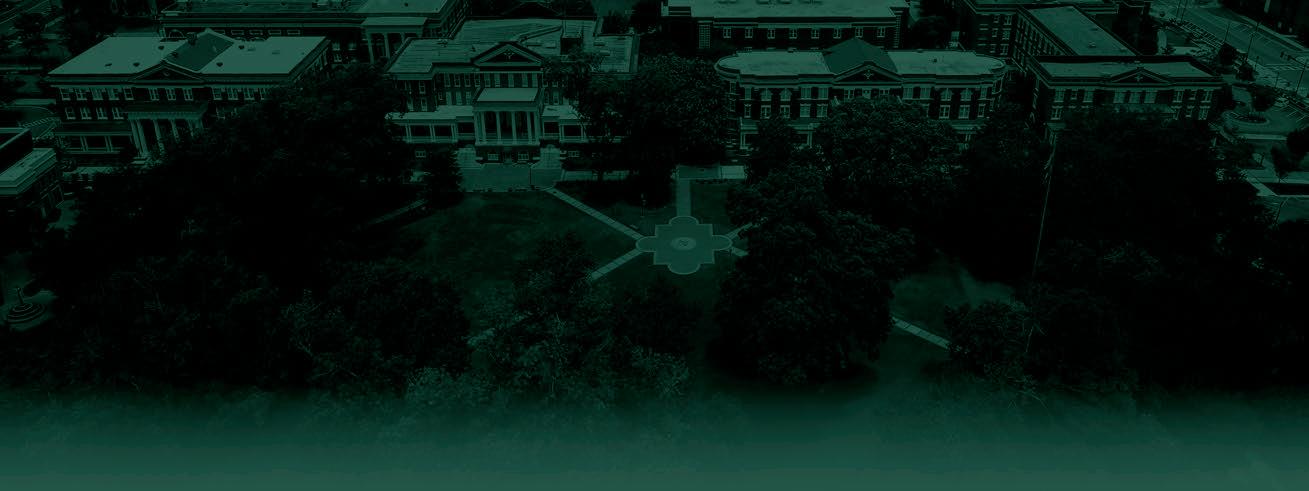
Three Georgia College & State University seniors majoring in early childhood education, communication and art have been named Fulbright semi-finalists.
They join a growing number of semi-finalists in recent years from Georgia College.
If selected as finalists, their travels will take them to Argentina, Greece and South Korea. Roughly half to onethird of all semi-finalist applications are accepted as ‘finalists,’ the term used for Fulbright Scholarship recipients. Final status should be announced no later than June.
The university’s 2022 Fulbright semi-finalists are: Annabelle Erb, a senior early childhood education major from Johns Creek; Anagha Ramakrishnan, a senior communication major and English minor from Marietta; and Maya Whipple a studio art major with a minor in Spanish from Gordon.
“I am very proud of the hard work that not only these semi-finalists put into their application but all that our applicants demonstrated in applying to the Fulbright Scholarship Program,” said Anna Whiteside, coordinator of Georgia College’s National Scholarships Office.
“The Fulbright Scholarship provides wonderful opportunities for our alumni to learn more about the world and how to engage as respectful global citizens,” she said.
Selection for the Fulbright U.S. Student Program is rigorous. About 12,000 students apply each year. In the U.S., about 1,900 grants are awarded annually for all fields of study that take place in 160 countries. More than 400,000 Fulbright recipients have participated in the programs since its inception in 1946.
Prior to Whiteside’s helmsmanship and the creation of a National Scholarships Office in 2015, the university had three Fulbrights. Since then, more than 30 Georgia College students have received Fulbrights and other illustrious scholarships or fellowships––such as the Marshall Scholarship, Truman Scholarship, Newman Civic Fellowship and National Science Foundation Graduate Research Fellowship.
Numbers increased as students came to value and utilize advice and support from the scholarship office. Applying for national scholarships can be complicated and take more than a year. Whiteside navigates students through the myriad of different programs, keeping them informed of deadlines and informational webinars.
She also helps students improve their personal essays by reading multiple drafts and making suggestions for added details or striking the right tone. She and a group of professors conduct mock interviews to ready students, and these can be intense with difficult questions. Faculty interviews help students clarify their goals and present clear visions.
Applicants are selected based on statement of purpose, academic or professional record, personal qualifications, language preparation, engagement in host communities and impact candidates could have promoting an understanding between nations.
“While our semi-finalists are each applying to different programs,” Whiteside said, “the one unifying factor is that they each exhibited the ability to represent the U.S. well abroad and to promote mutual understanding.”
Annabelle Erb applied for an English Teaching Assistantship (ETA) in South Korea. She hopes to use her early childhood education degree to teach English to children there. She believes this will “greatly benefit” her future teaching of phonics in the U.S.

If selected, she’s looking forward to traveling and learning a new language and culture.
At Georgia College, Erb enjoyed coteaching in local schools. This structure is similar to what she expects as a teacher in South Korea. Getting integrated into a new culture will help her connect with future students from different backgrounds.
Anagha Ramakrishnan applied for an English Teaching Assistantship in Greece. A communication major and English minor, she hopes to teach at Athens College, sightsee and get involved in a debate and English language theatre club.
Ramakrishnan worked on her application for a year, but to get a Fulbright U.S. Scholarship she needed to be an American citizen. Ramakrishnan took her oath of allegiance in September 2021, one month before the application deadline.

“I’ve always been fascinated by Greek culture, and I felt like my personal values aligned with Fulbright’s,” said
Erb’s been interested in Fulbright since sophomore year when Whiteside suggested she apply. Her “vote of confidence” kept Erb going, and she was “pleasantly surprised” at achieving semifinalist status.
“I feel so thankful to have been recognized as worthy of making it this far,” Erb said. “Teaching English abroad through the Fulbright would allow me to grow as an educator and model lifelong learning to my future students.”
“I hope I can show my students how going after your dreams and working hard can open so many exciting doors and opportunities.”
Ramakrishnan, who plans to get a Master of Fine Arts in film and become a documentary filmmaker.
She’s grateful for Whiteside’s guidance.
“She encouraged me in so many ways and eased my anxieties,” Ramakrishnan said. “I really cannot thank Ms. Whiteside enough for seeing the potential in me.”
“I feel incredibly grateful to have made it this far. Fulbright is such a prestigious award. Even if I do not make it as a finalist, just being named a semifinalist is an honor in and of itself. I’m so thankful to the faculty and staff at Georgia College who have supported me throughout this journey.”
Maya Whipple applied for an English Teaching Assistantship in Argentina. She hopes to expand her education in studio art and Spanish while “immersed in the Argentine environment.”
Becoming a semi-finalist was a little nervewracking, Whipple said, because she’s never been outside the country for long.
“But it would be the experience of a lifetime,” she said. “I’ll continue to polish my Spanish-speaking skills and do everything necessary to ensure my best performance as a teacher’s assistant in Argentina. Latin culture is filled with vibrant art, which is something I look forward to.”
In the future, Whipple would like to be an entrepreneur and open her own bakery and art studio. She plans to conduct a supplementary project involving art and baking in Argentina.
Whipple is also appreciative of the help she got from the National Scholarships Office. Her application went through so many edits and revisions at Georgia College, she didn’t think she’d make it through the first round of Fulbright deliberations.
“I feel very accomplished to have made it this far in the process. Becoming a Fulbright semi-finalist has instilled a great deal of confidence within me.”

9 | 2022 GCSU HIGHLIGHTS
Annabelle Erb
Anagha Ramakrishnan
Maya Whipple
Art professor’s mural enlivens part of downtown Macon
The Spirit of Macon is renewed with the visual representation of music in the streets.
The Macon Transit Authority (MTA) formally presented a public art installation that enlivens a drab corner of downtown with vibrant colors, dynamic images of native wildlife and graphic renderings of Macon’s iconic city skyline.

Georgia College & State University
Associate Professor of Art and Graphic Design Abraham Abebe updated his original Spirit of Macon mural to feature the musicality of the city that launched the careers of Little Richard, Otis Redding, the Allman Brothers Band, Robert McDuffie and Jason Aldean. In his artist statement, Abebe writes:
“Music plays an important role in our lives. It can make us calm and relaxed and allows us to feel all emotions. This mural reflects the importance of music and its
power when reflected and expressed in visual forms.”
The Spirit of Macon II builds upon Abebe’s original Spirit of Macon mural that transformed an MTA bus stop into a focal point for the city’s urban revival.

“Public art is very important for the city, for the community,” Abebe said. “We need to continue bringing artists into public art [so we can] serve the community by bringing the visual arts to the public.”
The Spirit of Macon mural is located at the corner of Poplar and Fifth streets in downtown Macon.
The Spirit of Macon II mural is the beneficiary of a grant from the Linda Harriet Lane Fund administered by the Community Foundation of Central Georgia. It is a joint venture between the MTA and the Community Foundation.
10 | 2022 GCSU HIGHLIGHTS ACHIEVEMENTS OF OUR
AND STAFF
FACULTY
Special Ed associate professor named Governor’s Teaching Fellow

said, “but it’s also intense, and it moves quickly.”
He applied for the Governor’s Teaching Fellow program because he’s always rethinking his approach to “everything.”
“I am realizing there are a hundred different ways to deliver academic content, and a lot of them are more effective than what I have been doing and thought was successful,” Sumowski said. “I am reminded how much more there is to learn about our craft.”
Endere completes USG leadership institute
Professor Dr. Rob Sumowski is one of 12 faculty members from across the state selected as a 2022-’23 Governor’s Teaching Fellow.
Former Georgia Governor Zell Miller started the yearlong symposium in 1995 to provide state education faculty with opportunities to learn important teaching skills.
“I’m honored, partly because the program was begun by Governor Zell Miller, a staunch advocate for public education and a man I met as a young teacher,” Sumowski said. “I’m also honored because everywhere I look on this campus, there are faculty who are so good at what they do that it makes my head spin. The idea that I might be considered as even approaching the high bar set by my colleagues humbles me.”
Sumowski will attend a series of meetings at the Louise McBee Institute of Higher Education at the University of Georgia. Fellows spend three days a month in master classes learning how to become more effective instructors.
The symposium is “a chance to pause and reflect on improving our delivery of instruction,” Sumowski
As part of the program, each fellow identifies a key academic project to focus on. Sumowski chose to redesign a course called “EDEX 4334: Teachers as Leaders” that senior special education majors take prior to graduation.
“The goal of this redesign is to proactively address some of the realworld challenges our graduates are about to confront, such as managing colleagues vertically (administration) and horizontally (peer educators) and supervising paraprofessionals, while dealing with time management, workload and stress,” he said. “I hope the benefits of redesigning this course will directly impact teacher retention and reduce attrition among our program’s graduates during the first years of their teaching careers.”
Georgia College & State University Senior Budget Director Josefina “Fina” Endere completed The University System of Georgia Executive Leadership Institute.

The Executive Leadership Institute is a comprehensive 120-hour leadership development program facilitated by leading experts in leadership. Successful candidates enhance their leadership skills to prepare for potential high-level advancement within the USG.
Georgia College Vice President for Finance & Administration Lee Fruitticher nominated Endere to participate in the ELI program.
Dr. Erin Weston nationally recognized for dissertation
– Dr. Rob
Dr. Erin Weston, director of firstyear experience, has been recognized for her research and dissertation. She has been named by NASPA— Student Affairs Administrators in Higher Education—as the runner-up for the Melvene D. Hardee Dissertation of the Year Award.

11 | 2022 GCSU HIGHLIGHTS
I am reminded how much more there is to learn about our craft.
Sumowski
Few things make an immediate impact as great as the university’s visiting scholar programs. Periodic academic visitors, whether long- or short-term, are a boost for everyone involved.
Visiting scholars participate in the productive activities of a new department; expose Georgia College & State University faculty to novel ideas and fresh perspectives; engage students with people who are prominent in their fields; and build heightened recognition for the university.
“The purpose of visting scholar programs is to provide our students, our faculty, our colleges and departments with opportunities for visitors to interact with and allow them the opportunity to engage in ways that would expand and enrich the student and faculty experience,” said Dr. Costas Spirou, provost and vice president for Academic Affairs.
In 2022, three experts came for week-long visits.
Former Olympian Butch Reynolds worked directly with students and faculty in the College of Health Sciences on issues of substance abuse and ethics in exercise science. In March, Dr. Peter Cardon spent a week with students and faculty in the department of information systems and computer science. A professor of clinical business communication at the University of Southern California, Cardon shared his deep interest in information technology and how artificial intelligence influences communication.
In April, the economics department hosted College of Charleston Economics Professor Dr. Douglas Walker. A former Georgia College faculty member, Walker talked to students about the socioeconomic impacts of gambling.
Whether visiting scholars come for a week or a year—they all greatly supplement life on campus, Spirou said.
Martha Daniel Newell visiting Scholar Dr. Carla Walter taught students about global perspectives of indigenous dance and religious histories.
Through classes and public lectures, Walter helped students and community members learn to use dance as a lens for understanding different cultures.
The Newell Scholar position was created in 2011 for long-term visitors from any academic discipline in the College of Arts and Sciences (COAS).
The Paul D. Coverdell Visiting Scholar attracts policy scholars within humanities and the social sciences.
Veteran public administrator turned university professor Dr. Victoria Gordon used her Coverdell position to focus on the 19th Amendment, which guaranteed women the right to vote. This Fall, Gordon engaged Milledgeville Mayor Mary Parham-Copelan in a conversation that resulted in the Milledgeville City Council adopting a proclamation on the importance of the 19th Amendment. She also organized panels focusing on women in politics and a lecture during Constitution Week.
“Visiting scholars are an important piece to our endeavors and quest for academic excellence,” Spirou said. “These interactions are not just for faculty and students but the community too. It brings vibrancy to the intellectual environment here on campus and in Milledgeville.
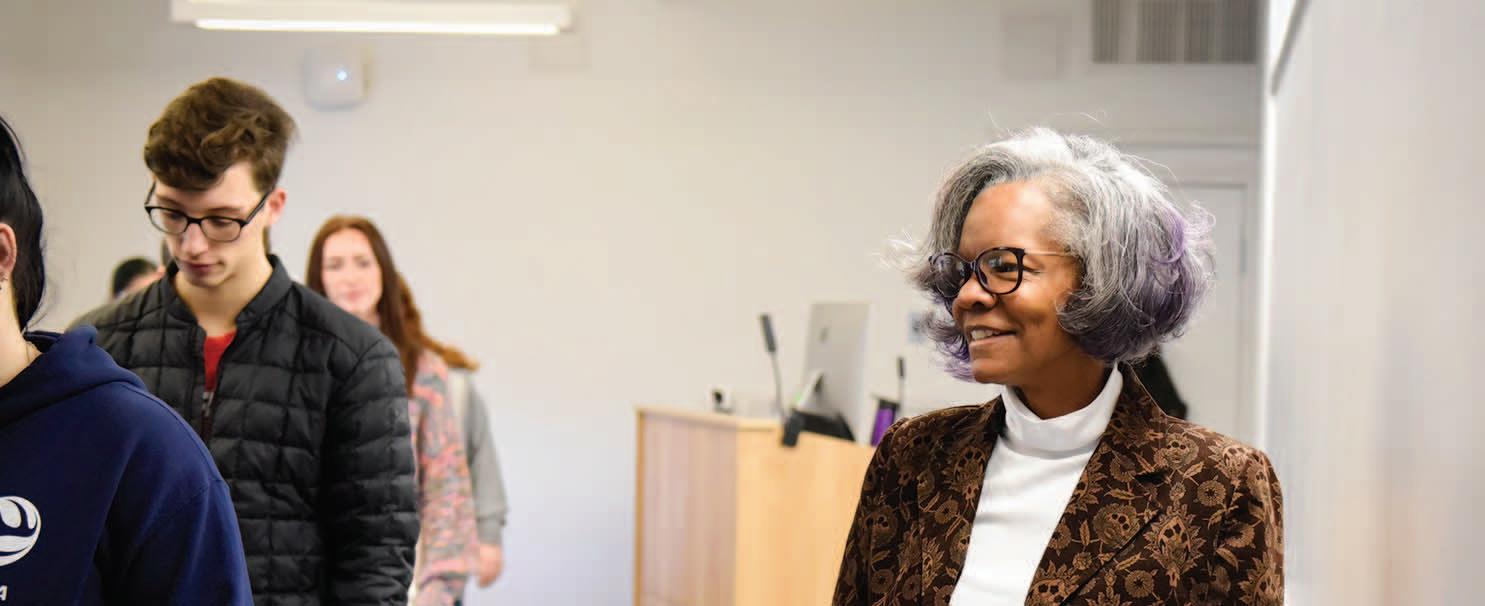
12 | 2022 GCSU HIGHLIGHTS
Visiting scholars bring wealth of knowledge and new ideas to strengthen university
New Faces in Administration
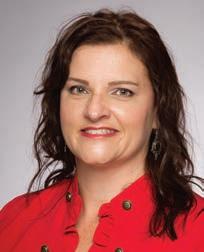
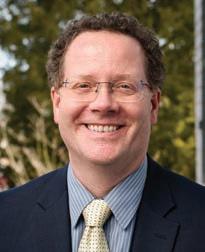
Georgia College welcomes the following individuals to senior administrative roles in 2022.


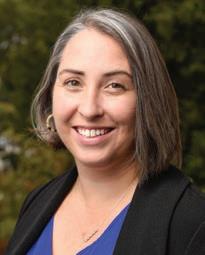

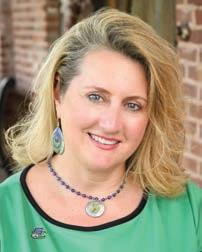

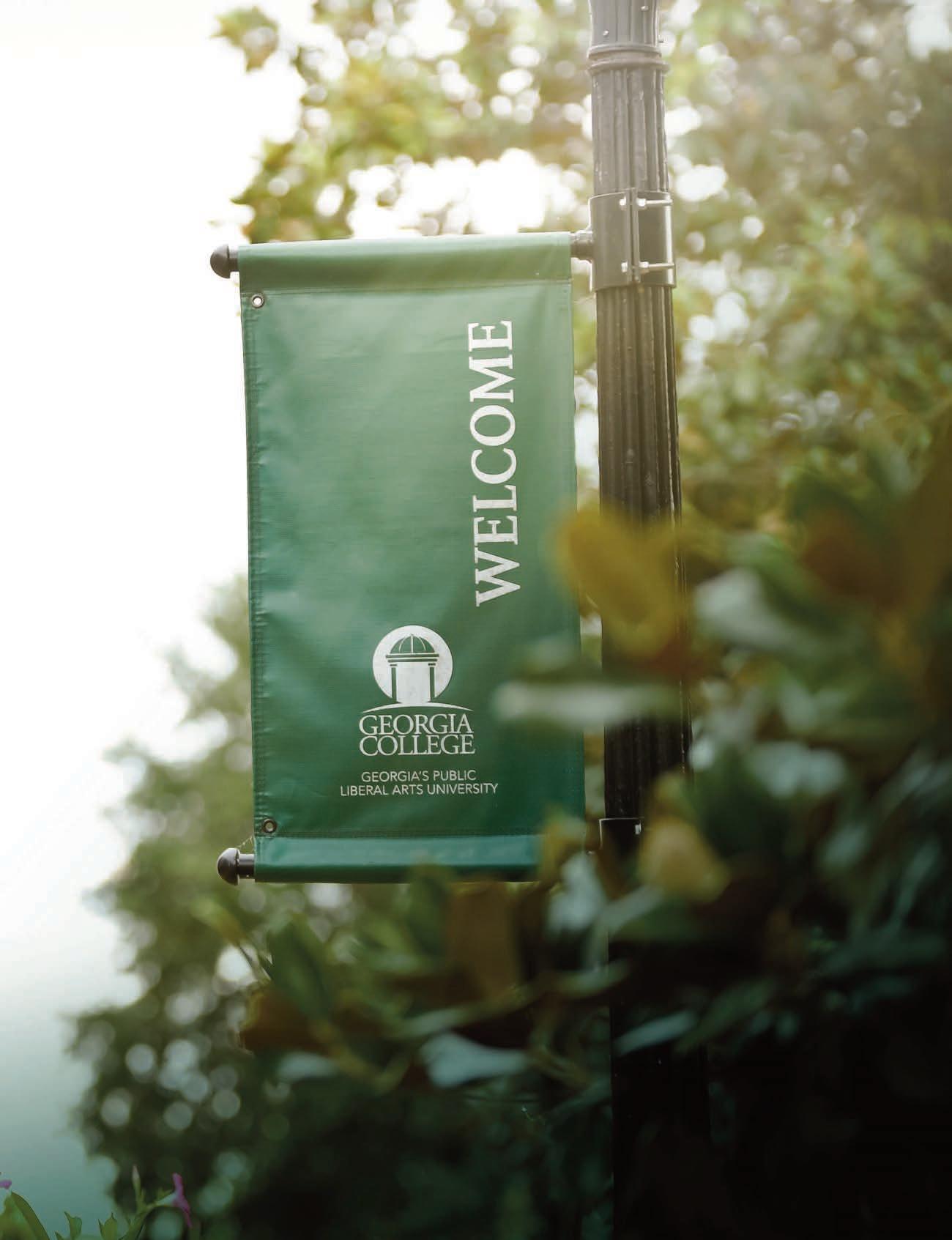 Shelley Strickland Vice President for University Advancement
Winston Tripp Associate Dean Arts & Sciences
Angela Criscoe Executive Director School of Continuing and Professional Studies
Jennifer Graham Interim Chief Diversity Officer
Tanya Goette Associate Dean of the College of Business
Holley Roberts Associate Provost and Director of the Graduate School
Nicole DeClouette Interim Associate Dean in the College of Education
Shelley Strickland Vice President for University Advancement
Winston Tripp Associate Dean Arts & Sciences
Angela Criscoe Executive Director School of Continuing and Professional Studies
Jennifer Graham Interim Chief Diversity Officer
Tanya Goette Associate Dean of the College of Business
Holley Roberts Associate Provost and Director of the Graduate School
Nicole DeClouette Interim Associate Dean in the College of Education
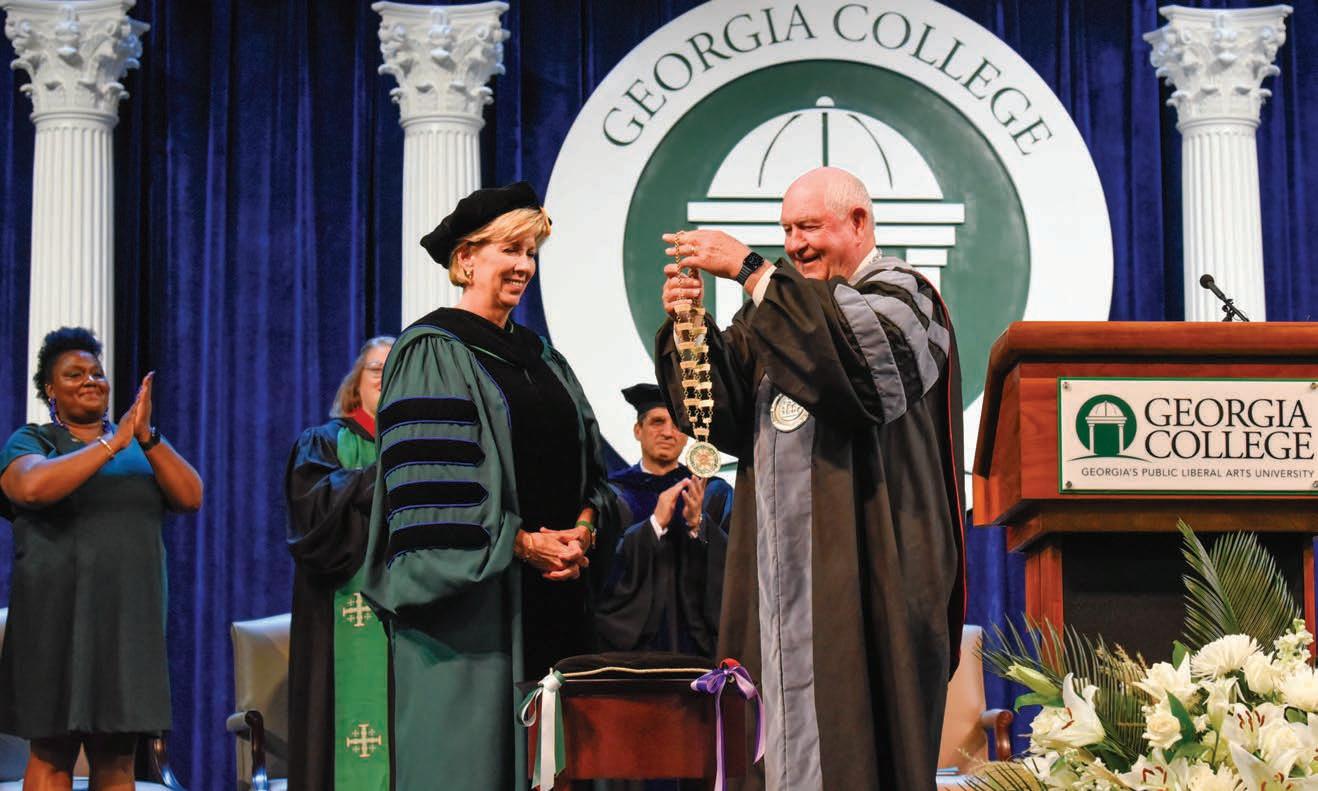
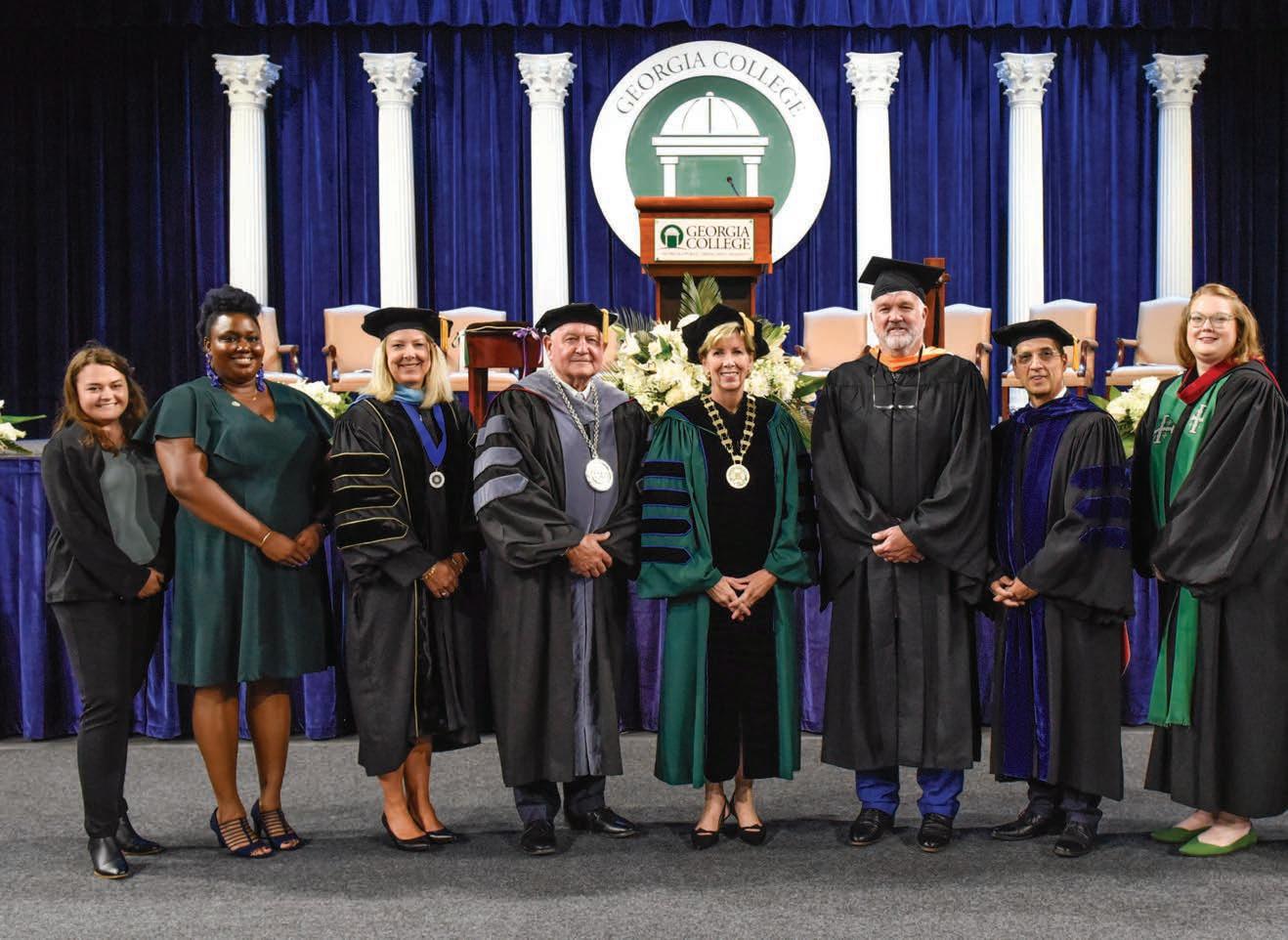

UNIVERSITY
MILESTONES AND
A New Chapter
Cathy Cox inaugurated as 12th President of Georgia College & State University


The Georgia College & State University community gathered to mark a new chapter in the institution’s 133-year history, the inauguration of President Cathy Cox.
In the ceremonial highlight of the daylong celebration, University System of Georgia Chancellor Sonny Perdue conferred upon Cox a presidential medallion emblazoned with the official seal of Georgia College & State University, signifying the transition to her leadership of the institution.
“President Cox, leading this university must be for the benefit of the students, the community [and] the state,” Chancellor Perdue said. “By accepting this responsibility, you’re making a commitment to this college’s mission of the liberal arts and to preparing students to make a difference in this world.”
The inauguration ceremony included remarks from dignitaries representing various stakeholders within the university community. Dr. Jennifer Flory is the presiding officer in the University Senate. She expressed her hope that Cox’s leadership will continue confidently progressing Georgia College on the path to preeminence that began with the announcement of the public liberal arts designation under former President Dr. Rosemary DePaolo.
“We know you as a student-focused and aspirational leader with the insight and persistence to lead us into an uncertain but promise-filled future,” Flory said. “We are very fortunate to have you at the helm at this point in our history, and I am confident that you are the right person to lead our institution.”
of the Student Government Association, commended Cox
for the way she forges meaningful relationships with students.
“As president of a university, there is always some important task on the agenda that must be taken care of, but even with her busy schedule, President Cox always goes out of her way to make sure she is where the students are,” Congdon said. “This means a lot to students.”
The inauguration was a true community event with delegations representing fellow USG institutions, both houses of the Georgia General Assembly, Georgia Military College, Central Georgia Technical College, the City of Milledgeville, the Baldwin County Commission, the Baldwin County Sheriff’s Office and the Baldwin County School District.
In her inaugural address, Cox thanked everyone for celebrating this historic occasion with her. She then reiterated the importance of the task before her: harnessing the power of a liberal arts education to prepare students to take ownership of and lead a world beset with complexity, complacency and indifference.

“I am excited by the idea that we can utilize one of the most classic forms of education— the liberal arts—to train students to recognize, to analyze, to care about and to help solve some of the most challenging issues that society faces today,” Cox said. “Our graduates will make the world a better place. Armed with superior abilities to analyze issues, apply innovative solutions and build teams and communities that sustain a better way forward.”
“They won’t be satisfied with the status quo— and neither are we,” she said. “The future looks better because we at Georgia College & State University will make it so.”
15 | 2022 GCSU HIGHLIGHTS
Kaitley Congdon, president
GCSU nursing and teaching programs highly rated in new ‘Best Colleges’ rankings

Georgia College & State University continues acquiring accolades as a top-ranked institution in the region and country.
The 2023 U.S. News & World Report Best Colleges list designated Georgia College’s School of Nursing as the top, public undergraduate nursing program in Georgia.
“Media organizations like U.S. News & World Report consistently reaffirm what Georgia College students, parents and alumni already know: our institution offers an exceptional and contemporary public liberal arts education and prepares our students for successful careers,” said Cathy Cox, president of Georgia College & State University. “Georgia College’s reputation for academic excellence and transformative experiences ranks with the best in higher education and will continue to attract top students who want the unique, challenging learning environment we offer.”
Additional insight from the “Best Colleges” report includes Georgia College ranking seventh on the list of top public schools in the South— rising two spots from last year’s ranking. This is the fourth year in a row Georgia College has led all other Georgia institutions in this category.
The guidebook lists Georgia College 22nd in the Best Regional Universities in the South, leading all other public, Georgia universities in this criterion. Best Regional Universities are not ranked nationally, but rather against their peer group in one of four geographic regions—North, South, Midwest and West.
Georgia College ranked 12th in the category for undergraduate teaching universities in the South, earning top honors for University System of Georgia institutions in that segment.
Several Georgia College graduate programs received national recognition in U.S. News & World Report’s “Best Online Programs Rankings” for 2022.
The highest-ranked in the state, the university’s online graduate nursing programs ranked 29th in the nation. Additional programs receiving recognition include the Master of Science in Nursing with track options of Family Nurse Practitioner (FNP), Psychiatric Mental Health Nurse Practitioner (PMHNP), Women's Health Nurse Practitioner (WHNP), Nurse Educator (NE) and Nurse Midwifery.
U.S. News & World Report also listed two online master’s degrees in business (non-MBA) 41st nationally—the second-highest ranked in the state. That includes Georgia College’s Master of Logistics and Supply Chain Management and Master of Management Information Systems.
The Master of Business Administration (Georgia WebMBA®) at Georgia College ranked among the best in the country at 69th—the second-highest public university in the state. The program allows professionals to earn an MBA completely online without interrupting their work and personal lives.
"The continued recognition of our online graduate programs as top tier in the state and the nation shows the exceptional quality of the education provided through the programs," said Dr. Costas Spirou, provost and vice president for academic affairs. "This would not be possible without the dedication of the faculty and staff who work within each program to ensure each student receives a high-quality education."

16 | 2022 GCSU HIGHLIGHTS
GCSU named a ‘most engaged campus’ for college student voting
The ALL IN Campus Democracy Challenge recently named Georgia College & State University one of the nation’s 2022 ALL IN Most Engaged Campuses for College Student Voting.
The ALL IN Challenge is part of an initiative by Civic Nation to educate citizens to be active in the democratic process and make voter participation a defining feature of campus life. Its goal is to help students graduate with the knowledge, skills, behaviors and values needed to be informed and active citizens.
Georgia College joins a group of 394 colleges and universities recognized for making intentional efforts to increase student voter participation and nonpartisan democratic engagement.
“We are justifiably proud of our civically-engaged students and our institutional commitment to prepare our students to become lifelong voters and engaged community members,” said Dr. Janet Hoffmann, Georgia College’s campus coordinator for the American Democracy Project.
Hoffmann is the point person for student voter education and engagement on campus. She spearheaded the work that earned All IN recognition. Last year, Georgia College won best in the nation for public, four-year institutions with the highest student voter registration rate. The National Study of Learning, Voting and Engagement (NSLVE) report showed more than 76% of Georgia College students voted in the 2020 presidential election.
That rate exceeds the national average for student voting in 2020, which was 66%.
“We have steadily increased our voting rates since 2012,” Hoffmann said. “Our registration rates have long been above average. Youth voted in record numbers in 2020, and our students led the pack in our category for registration and voter rates.”
Georgia College is one of seven state universities recognized as a most-engaged campus for college student voting. Four actions are necessary to win acknowledgement:
• Democracy Challenge
Participation in the ALL IN Campus
• Submission of a 2022 democratic

Sharing data tracked by the NSLVE
• engagement action plan for ALL IN Commitment by the university president.
•
At recognized schools, students worked to register voters, served on campus voting coalitions, spearheaded voter education efforts and advocated for campus polling locations, according to Jennifer Domagal-Goldman, executive director of the ALL IN Campus Democracy Challenge.
“College student voter turnout has increased since 2016,” Domagal-Goldman said, “and this increase has been driven by students. The ALL IN Campus Democracy Challenge is excited to expand our ALL IN student voting honor roll to recognize these student voting champions across the country.”
17 | 2022 GCSU HIGHLIGHTS
Andalusia Farm is America's newest National Historic Landmark

eorgia College & State University celebrated its second National Historic Landmark (NHL)—Andalusia Farm, home of author Flannery O’Connor, ’45.
The National Park Service recognizes less than three percent of America’s historic sites with this designation. Georgia’s Old Governor’s Mansion was the campus’ first NHL, receiving this recognition in 1973.
“There are campuses across the country that have National Historic Landmarks, but this is a rarity in Georgia to have two in a town of our size,” said Matt Davis, director of Historic Museums at Georgia College. “It’s an accomplishment we can all be very proud of.”
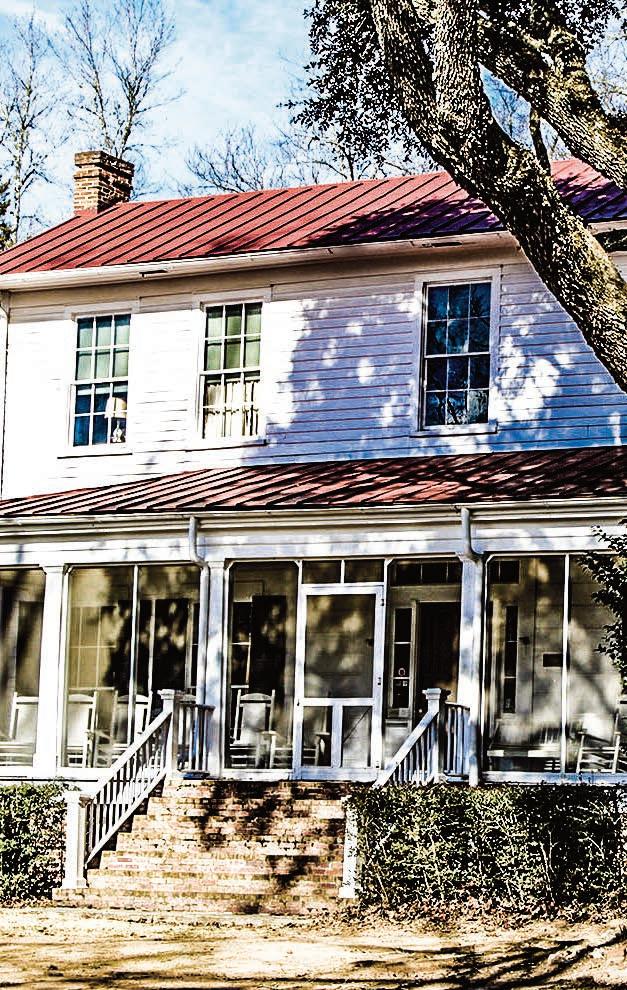
O’Connor and her family moved to Milledgeville when she was 15 years old. She graduated from Peabody High School in Milledgeville in 1942, before enrolling at Georgia State College for Women, now known as Georgia College.
From 1951 until her death in 1964, O’Connor would complete the bulk of her literary output at Andalusia. Many of the personalities and environs in and around Andalusia inspired her works.
In August 2017, the site was gifted to O’Connor’s alma mater, Georgia College.
The National Park Service added Andalusia to National Register of Historic Places in 1980. In 2019, the National Trust for Historic Preservation named Andalusia a “Distinctive Destination.”
“It’s so important that the places we deem nationally significant represent the diversity of the American experience,” said National Park Service Director Chuck Sams. “O’Connor’s contributions represent a unique space in American literature, and her works continue to inspire new
O’Connor’s home serves as a reminder of who she was and the lives she touched with her writing.
“We are so pleased that Flannery O’Connor’s home has gained national attention through this distinction,” said Cathy Cox, president of Georgia College. “A notable figure in the literary world, her creative works continue to impact many of our students and aspiring authors throughout the world.”
18 | 2022 GCSU HIGHLIGHTS
Award heralds GCSU’s entry into international research consortium

Georgia College & State University is growing its reputation as an institution focused on undergraduate research.
“At orientation, I had the parents of a biology student come up and tell me they're so excited about undergraduate research,” said Jordan Cofer, associate provost for Transformative Learning Experiences. “They wanted to know all the opportunities that are available. They wanted to go see the lab. We’re getting that reputation.”
It's not just students and their parents taking note.
Georgia College joined the Vertically Integrated Projects consortium and won an award for interdisciplinary collaboration in undergraduate research.

The Vertically Integrated Projects (VIP) consortium is a group of over 40 universities operating in 13 countries across the globe. The consortium promotes and supports projects that sustain long-term research activities.
This summer, Georgia College joined the University of Georgia and Georgia Southern University in winning the Innovation in Partnership Building Award at the VIP Consortium’s 2022 Annual Meeting. Georgia College received the award for cultivating a group of multi-year, interdisciplinary research projects that bring people together to tackle societal challenges, explore innovative technology and develop new understanding and knowledge.
The award recognizes the environment of collaboration Georgia College researchers foster across multiple research projects. By recruiting talented student researchers from different colleges and departments, Georgia College researchers benefit from a variety of perspectives at project conception, a larger skill set when designing and facilitating research and a greater reach when communicating the results.
The research teams that helped Georgia College win the award amplify those attributes by following the VIP model of inviting undergraduate students to dedicate
themselves to projects over multiple years. Through sustained involvement, student researchers have the opportunity to participate in a project from ideation to dissemination and benefit from closer relationships with their peer researchers and faculty mentors.
“Most of the time we do undergraduate research in senior year—it might be a kind of capstone experience,” said Hasitha Mahabaduge, associate professor of physics and director of Georgia College’s VIP program. “Verticallyintegrated projects help them to make that connection to their team—to start as a freshman or sophomore and continue for two or three years.”
Mahabaduge said Georgia College’s liberal arts mission provides an ideal foundation for VIP projects because it encourages students to engage the issues they’re passionate about with the curiosity to explore the topic in ways that are not confined to a single discipline.

Experiences students gain by participating in these verticallyintegrated, multidisciplinary research projects better prepare them for the work environment they’ll encounter after graduation.
“Employment is less about major than it's ever been—a lot of employers are no longer looking at specific majors,” Cofer said. “Our students stand out because they've had these really unique experiences; they’ve been able to disseminate the research; and they’ve got the communication skills so they can go out and talk about them. It’s so much more engaged than if it was just theoretical.”

19 | 2022 GCSU HIGHLIGHTS
Contemporary liberal arts:
GCSU embraces its academic mission to meet workforce needs
Georgia College & State University’s liberal arts mission teaches students a variety of marketable skills for today’s workforce—critical thinking, teamwork, effective communication and the ability to react to uncertainty with boldness.
These skills can be transferred across any number of jobs and are useful for life in general.
At Georgia College, the liberal arts serve as a foundation, on top of which is built the specialized workforce training students acquire through their major.
“We have intentionally realigned our academic affairs strategy to maintain our commitment to the liberal arts mission and identify ways to focus on career preparation, workforce development and further economic development,” said Dr. Costas Spirou, provost and vice president for Academic Affairs. “We must be willing to adjust to meet the workforce needs of our rapidly moving state and world. That’s something we consistently ask ourselves—what are the needs of our students and how can we respond to meet those?”
Georgia College is committed to staying flexible and dynamic— evolving courses and degree offerings to meet workforce needs.
For instance, Georgia College added a third nursing cohort to address the shortage of healthcare workers in the state.
“We now have three cohorts for our nationally-recognized undergraduate nursing program,” Spirou said. “At a time when healthcare workers, especially nurses, are highly needed but in short supply, we knew this would be valuable. As a result, we increased the number of nursing majors this year from 112 to 152.”
U.S. News & World Report publishes a yearly 100 Best Jobs report. The 2022 report lists nurses among the top 12 jobs along with data scientists and financial managers—two other new programs now available at Georgia College.
The new bachelor’s in data science is a collaboration between the J. Whitney Bunting College of Business and Technology and the College of Arts and Sciences, bringing together a well-rounded experience for students.
In the 21st century, technology is as important in our daily lives as it is in business.
Last fall, the John H. Lounsbury College of Education launched a Maker Space to place new technology in the hands of teacher candidates.
From virtual reality sets to 3D printers to drones and robotics, Dean Joseph Peters said he hopes students take their experience in the new Maker Space to the schools where they teach.
“Schools will start to use more technology in the future, and we want our students to be ahead of the curve on what's going to be next,” Peters said.
These are just a few of the new opportunities available at Georgia College. But, they show a glimpse into the heart of the university and how its liberal arts mission drives success.
“We are committed to being responsive to the economic and workforce needs of the state, as well the needs of our students,” Spirou said. “In the process, we strategically reimagine the academic mission and the role of liberal arts and sciences in higher education and our society.”

20 | 2022 GCSU HIGHLIGHTS
We must be willing to adjust to meet the workforce needs of our rapidly moving state and world.
Dr. Costas Spirou, provost and vice president for Academic Affairs
New college of business name emphasizes role of technology and career readiness
As technology changes, so does business education — and Georgia College & State University’s J. Whitney Bunting College of Business is changing with it.
The school became the J. Whitney Bunting College of Business and Technology.
The new name acknowledges the rapidly advancing role of technology in the business environment. In the future, nine out of 10 jobs will require digital skills, according to the World Economic Forum.
“Technology drives so many changes we witness around us—in business, society, and in our personal lives,” President Cathy Cox said. “Georgia College understands the immense importance of these changes and is committed to offering a curriculum that completely embraces technology.”
Cox pointed to the university’s public liberal arts mission as a dynamic and career-focused approach to provide students with cutting-edge skills and adaptability.

Other changes in the business college include:
A new name for Georgia College’s
• Accounting Department, now called the department of accounting and business law. The department already housed faculty who teach business law and ethics, a core requirement for a business degree. The new name reflects that.
The introduction of a new Bachelor of Science degree in data science.
• Employers say they want workers who can interpret and understand data, do quantitative analysis and use predictive modeling. A new Bachelor of Science degree in finance that provides an optional • concentration in financial technology. This will include courses in financial management and programming, financial forecasting and payment processing.

The launch of a Center for Innovation and Entrepreneurship this fall.
• This initiative will provide students, faculty and community members with opportunities to collaborate and advance regional economic development.
“A liberal arts education equips students with the critical thinking necessary to navigate the complexities of life and become 21stcentury leaders,” she said.
“In today’s rapidly changing society, it is more important than ever to ensure that the liberal arts curriculum at Georgia College will continue to evolve in order to meet
employer needs,” said Dr. Micheal Stratton, dean of the J. Whitney Bunting College of Business and Technology.
“Technology is embedded into the fabric of all our teaching and learning experiences,” he said.
“These experiences will differentiate our students in the marketplace and help them stand out to employers.”
21 | 2022 GCSU HIGHLIGHTS
Center for Innovation and Entrepreneurship brings opportunities to collaborate
Students with a mind toward entrepreneurial spirit will now have a dedicated place on campus to explore their innovative ideas.
To broaden collaboration on campus and drive targeted societal impact, the J. Whitney Bunting College of Business and Technology has opened The Center for Innovation and Entrepreneurship.
“We envision this center as a cross-college endeavor—something all students from all majors, all faculty, no matter the department, can get involved in,” said Nicolas Creel, assistant professor of business law and director of The Center for Innovation and Entrepreneurship. “We look for expertise, regardless of where it lies, and ideas from students, regardless of where they’re at.”
Housed in the John H. Lounsbury College of Education building, the center will work in tandem with the Makerspace located there. It will bring additional resources to the partnership, like space for formal pitch decks, an annual pitch competition, access to interdisciplinary experts and more.
Modeled after the University of Georgia’s Innovation Gateway, students will have the opportunity to pitch their ideas for businesses and innovations to expert panelists in pitch decks—a short presentation to convey their business plan or idea.

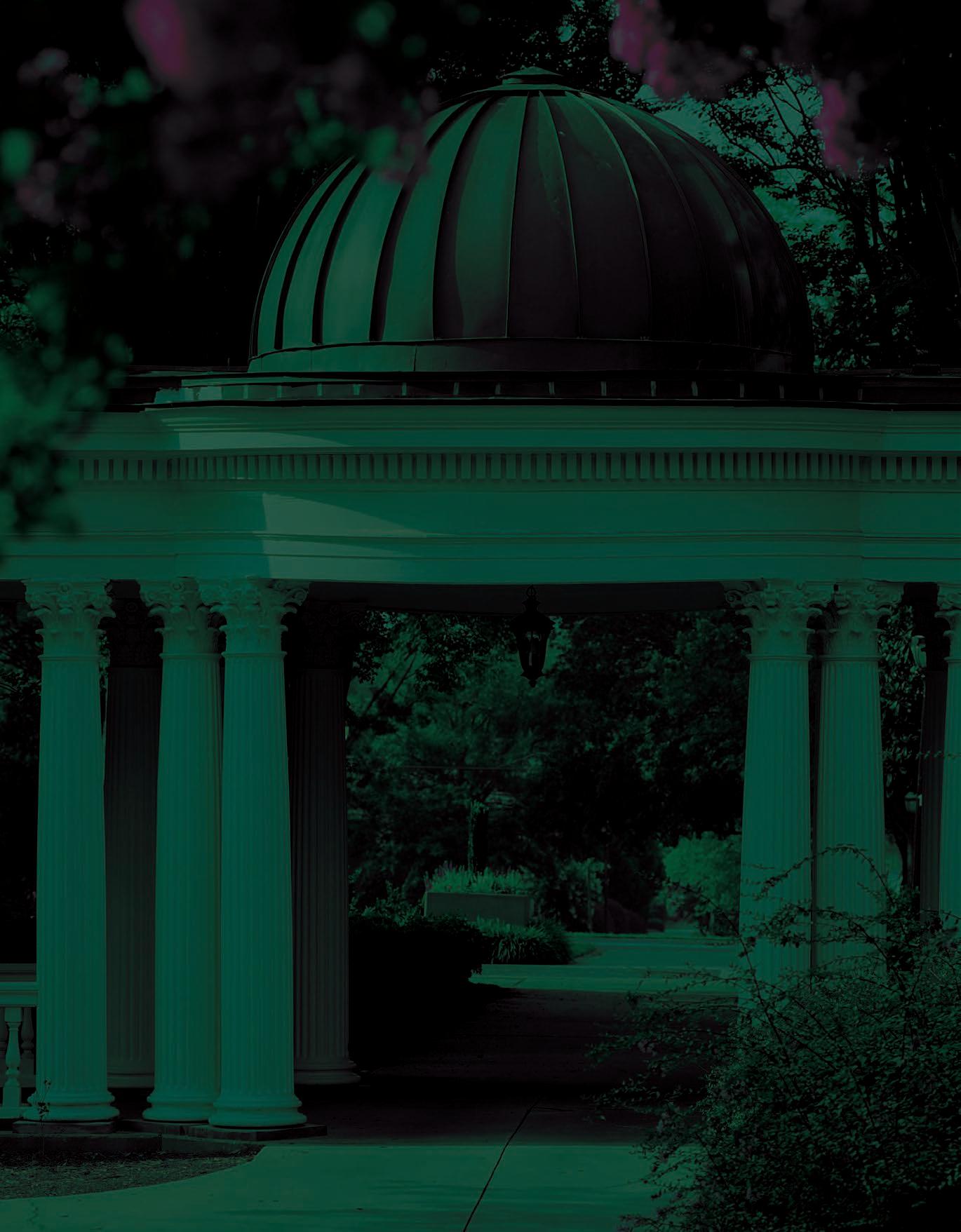
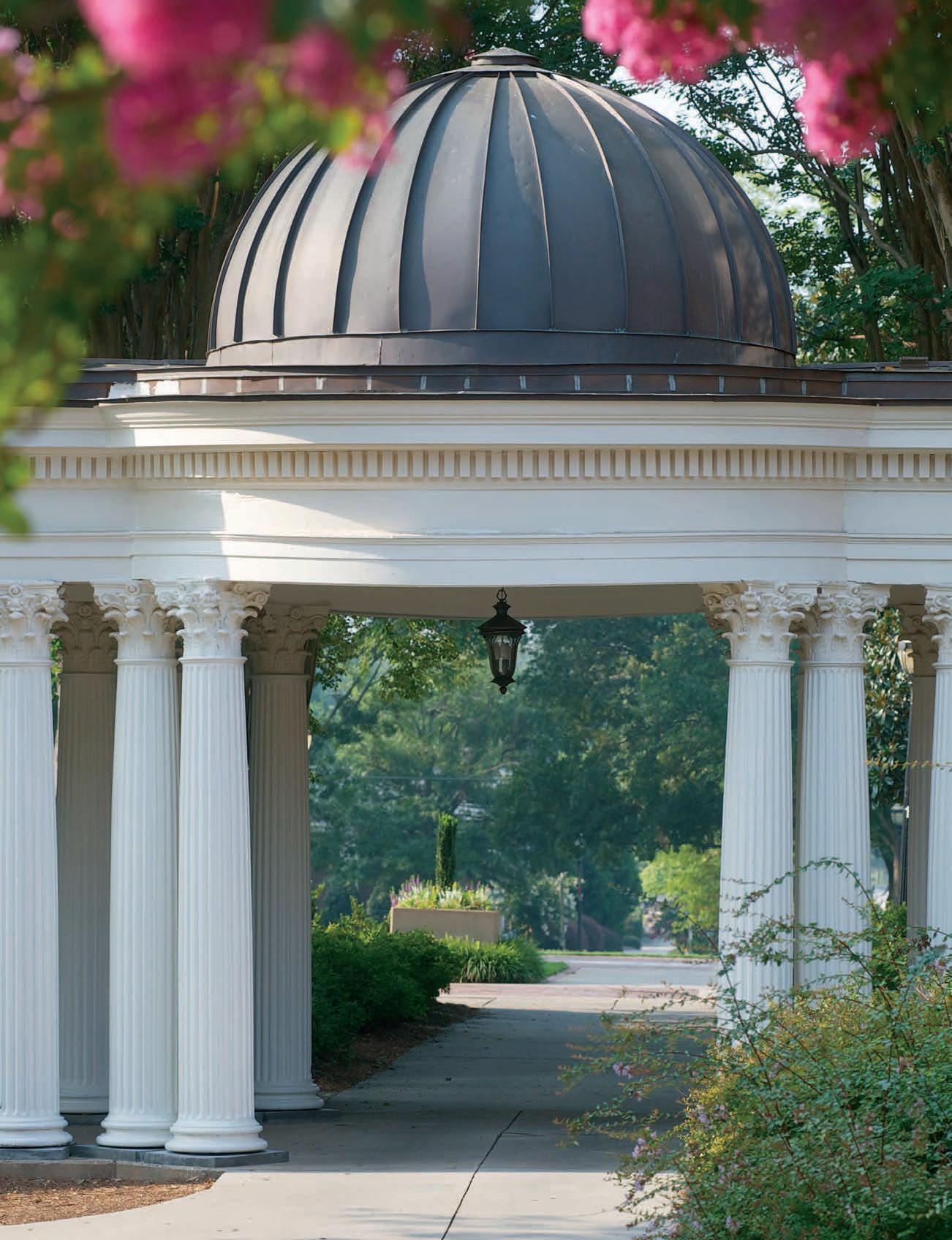
The center will serve as a library for the business-facing needs of students and the community. It will be the site of an incubator
for student and community businesses with low-cost resources and expert guidance.
Students will also have the opportunity to serve community members as part of a business consulting team for strategy, marketing, human resources, finance and technology.
The center will host Bobcat Business Builder Bootcamps, or “B-Quads,” which will be a twoday crash course in basic business building. Once a year, the center will also facilitate a business pitch competition with contestants judged by industry professionals. The winner of the competition will receive seed money and oversight for the growth and development of their ideas.
The center is also working with local economic development agencies, like the Central State Hospital Redevelopment Authority, to develop a community-centric business incubator.
College of Business and Technology Dean Micheal Stratton’s 2022-2027 strategic plan developed plans for the center. It’s a part of his plan for contributing a positive social impact to the surrounding community.
“A comprehensive and formalized center has the potential to further capitalize on our commitment to both high-impact practices and engagement with and service to local and regional organizations,” Stratton said in his plan. “The center is a space for organizations to engage our students and faculty experts on emergent technologies and critical policy issues.”
A BEACON for the education of change
The Office of Fraternity and Sorority Life created the National PanHellenic Council Historical Preservation Plaza at Georgia College & State University to honor the “Divine Nine”–the nine historically African American international fraternities and sororities on campus.
Former Director of Fraternity and Sorority Life Stacey Milner, ’11, ’15, engaged founding members of the African American Alumni Council (AAAC), students and staff to help create this monument.
“Students and alumni want something to connect them to the institution,” Milner said. “We noticed other campuses have monuments, so we wanted to have something similar at Georgia College.”
She researched Divine Nine sites at comparable institutions like Wake Forest University. Milner then created a mockup of the NPHC Plaza for former Georgia College President Dr. Steve Dorman, and developed the concept from there.

Milner credits founding African American Alumni Council members including Debra White Minor, ’88, and Pamela Trawick, ’91, as well as students like Jazmin Hunt, ’21, and donors including Ret. Brigadier General Jonathan McColumn, ’86, with helping to push for the plaza.
“My donation to the NPHC Plaza represents my commitment to join others in building a permanent shrine for students to inquire about its purpose and motivation,” he said.

“For alumni, it represents Homecoming on campus—a place to
reflect and provide well wishes to a curious bystander or a familiar face.”
The NPHC Plaza is historically significant to McColumn, who reflects upon the unique friendships he made with his fraternity brothers while balancing the rigors of college life.
"It highlights the cherished brotherhood experience I enjoyed with the young men of Kappa Alpha Psi," McColumn said. “Even more, the experience was broadened through the collective camaraderie now etched in my memory by, with and through the shared joys and struggles with the Divine Nine at GCSU.”
Milner sees the plaza as a natural evolution of students’ efforts to communicate a sense of belonging on the Georgia College campus.
“We had painted benches on campus,” Milner said. “Alumni loved those, because it symbolized their time at GCSU.”
However, alumni and students wanted something more.
“Everyone who belongs to a NPHC organization always wanted a historical preservation plaza of this magnitude,” she said. “They got excited about the idea of being connected to the institution and leaving a legacy.”
Milner believes NPHC organizations are that legacy, given the work its members put into establishing them.
“My hope is that the NPHC Plaza serves to tell the story of our history, and that it functions as a place where people who visit Georgia College see it as a symbol of change—the university’s embrace and appreciation of culture,” Milner said. “And that it allows individuals to ask questions of who we are, and what is special about our organizations.”
23 | 2022 GCSU HIGHLIGHTS
NATIONAL PAN-HELLENIC COUNCIL PLAZA
New Aquatic Sciences Center will provide water expertise

Careers in marine sciences are more important than ever— with oceans rising and the proliferation of toxic algae and pollutions. To ensure Georgia College & State University students are prepared, and to take advantage of faculty knowledge and expertise in this field, the university has opened the new Aquatic Sciences Center.
“We are seeing significant changes in our global climate that’s been rapidly accelerating in the last decade,” said Dr. Indiren Pillay, chair of biological and environmental sciences.
“These changes are making significant differences in our marine environment,” he said, “from marine microorganisms to marine animals and the introduction of pollution, including temperature pollution where slight warming of the oceans is creating different ecosystems.”
Ecological changes like increasing incidences of red tides and agal blooms are just some issues that could be studied at the new center. Microbiologists are concerned, Pillay said, because pathogens normally low in numbers are rapidly increasing and, in some cases, causing disease.
Out of 27 faculty in Georgia College’s Department of Biological and Environmental Sciences, about a third are linked in some way to water-related topics—both marine and freshwater. Faculty include Drs. Dave Bachoon, Andrei Barkovskii, Christopher Burt, Melanie DeVore, Greg Glotzbecker, Kalina Manoylov, Matt Milnes, Christine Mutiti, Sam Mutiti, Allison VandeVoort, David Weese and Kris White.
The new Aquatic Sciences Center will harness their knowledge and expertise under one umbrella. Existing strengths will be combined, and faculty will be encouraged to collaborate more fully, sharing equipment and ideas, Pillay said.
“Leveraging all this into a center will give us a unified mission and a unified approach, where we can train
students in real-life applications of what we’re teaching in the classrooms and labs,” he said.
A director will soon be selected to oversee the center, along with a research technician. With a centralized administration and structure, Pillay hopes the center will be a platform for more graduate and undergraduate research, additional grant writing, student training and community engagement. The new center will also allow for the creation of summer research programs for students.
Currently, the center is functional with a nominal physical presence in Herty Hall.
When that building is renovated, Pillay hopes custom changes will be made to accommodate the new Aquatics Sciences Center—alongside the current Observatory, Planetarium and the William P. Wall Museum of Natural History.
Numerous funding initiatives are underway. The university administration has already funded the construction of a water table. In addition, ASC faculty member, Dr. Dave Bachoon, already has two funded ASC-related research projects.
In conjunction with the Aquatic Sciences Center, a new concentration in marine biology has been added to the curriculum.

“Any sort of center of research or excellence, such as the Aquatic Sciences Center, is unusual for a school our size,” Pillay said. “But the Department of Biological and Environmental Sciences has a significant footprint on campus—in terms of the number of faculty and the number of students we cater to. So, the center is a natural conclusion.”
“It’ll elevate the visibility of the work we’re already doing and provide administrative support that will enable faculty to spend more time training and mentoring students in water-related research,” he said.
25 | 2022 GCSU HIGHLIGHTSGEORGIA COLLEGE | 25 | 2021 HIGHLIGHTS
Bon Appétit
Students learn history by picking up the fork
A group of Georgia College & State University history students expanded their knowledge of food on a Foodways study away trip to Savannah. They chronicled the diversity of food rituals in this Southern port city while eating at Lowcountry, Greek, Indian, Italian, Latin and Asian restaurants.


“It relates to history because it’s a different perspective of history. It not only shows the major impact food had on the South but also the world,” said history major Elijah Lopez of New York City, New York. “Food ties in so deeply with people’s lives and cultures and, being from New York, it has been an eyeopening experience to learn about the way of life down South.”
Fourteen students went on the fiveday trip as part of the “Experiencing the Ethnic South Through Food” class co-taught by history professors Dr. Craig Pascoe and Dr. James “Trae” Welborn. The course goes beyond biscuits and gravy to introduce students to an inherently multicultural palate shaped by diverse ethnic groups.
“We talk about patterns of migration and how different food influences and cultures intermingle to create new food traditions,” Pascoe said. “Southern foodways and traditions have always been inherently multicultural and really global in scope from the influences of all the different people who end up here.”

Prior to spring break, students learned how to make tamales from Letty Short at El Tequila in Milledgeville. They toured Comfort Farms in Milledgeville to learn about African plants like okra, a mainstay in many Southern recipes.
Later in the semester, they ate at the Thai restaurant LaDDa Bistro and a Creole restaurant in Macon. They went on a “food crawl” along Buford Highway to eat traditional street food by Muslim-Chinese Uighurs, as well as Vietnamese, Salvadorian and Ethiopian foods.

In the classroom, students learned the history and culture of various minority groups residing in the South. They tried various Southern ethnic dishes like biscuits and

country ham, Asian shrimp salad, black-eyed peas and cornbread.
“As a port town, Savannah’s going to have the greatest concentration of different ethnic groups than anywhere else,” Welborn said. “You'll also see ethnic groups throughout the South in smaller towns like Statesboro or Jackson, Mississippi, where you might have a Jewish family running a deli or a Greek family running a restaurant.”
The Spring Break trip was the highlight of the course, bringing all these concepts together. Students heard presentations from restaurant owners, who talked about how they ended up in Savannah and why they serve certain foods.
“I think what stood out the most on this trip was the variety and rich culture that could be experienced within one town,” senior psychology major Lucas Baird said. “My eyes have been opened to just how varied the South has become.”
26 | 2022 GCSU HIGHLIGHTS
$285 million impact on local economy
The impact on the regional economy by Georgia College & State University reached more than $285 million in 2021—an increase of $2.7 million from the previous fiscal year.
For each job created on campus, two off-campus jobs exist due to university-related spending.
“With more than 1,100 people working on our campus every day, and thousands of our students spending money in the local area, Georgia College clearly has a significant impact on our local economy,” Georgia College President Cathy Cox said. “Our annual payroll alone was nearly $65 million this year. In addition, we bring substantial intellectual capital to our region, and I hope our greater community recognizes the tremendous benefit of having a state university in its midst.”
Numbers are from an annual study commissioned by the Board of Regents of the University System of Georgia. They show the economic benefits Georgia College imparts on both the private and public sectors which extend to Baldwin, Bibb, Hancock, Jones, Putnam, Wilkinson and Washington counties.
In 2021, Georgia College created 1,013 jobs on campus for community members and supported another 1,778 jobs off-campus through products and services its employees and students purchased. Overall, USG schools had a $19.3 billion impact on the state’s economy. That’s a 3.8% increase since 2020. This included $13.1 billion in initial spending by students and USG’s 26 public colleges and universities on personnel and operating expenses.

More than 152,620 full- and parttime jobs were generated by USG schools.
The report highlights the vital contribution colleges and universities make toward a healthy state economy. They promote jobs, higher incomes and greater production of goods and services, according to the study conducted by the Selig Center for Economic Growth in the University of Georgia’s Terry College of Business.
Benefits for each institution were divided into several categories of related expenditures for colleges and universities. Those include spending by institutions for salaries and fringe benefits, operating supplies and expenses and other budgeted expenditures; spending by students who attend the institutions; and spending by institutions for capital projects.
Economic impact was measured by the initial spending of an institution for operations and personnel, as well as student spending. Total economic impact includes the effect of initial spending and secondary or indirect and induced spending that occurs when initial expenditures are re-spent.
IMPACT BY THE NUMBERS
$2.7m
INCREASE IN IMPACT OVER 2021
1,013 JOBS ON CAMPUS FOR COMMUNITY MEMBERS ANNUAL
$65m
27 | 2022 GCSU HIGHLIGHTS
GEORGIA COLLEGE & STATE UNIVERSITY GENERATES
PAYROLL
GCSU pre-med mentoring program has 100% application success rate to medical school

They say going to college is like drinking from a water fountain—in medical school, a fire hose.
At Georgia College & State University, a group of pre-med students already know what it’s like to drink from a hose and withstand the deluge.
They have a mentor by their side.
Dr. Ashok Hegde is the William Harvey Endowed Professor of Biomedical Science at Georgia College. In 2016, he took over the university’s pre-med mentorship program from Dr. Kenneth Saladin, a retired professor of biology, who wanted to better equip tomorrow’s medical students.

The results of Saladin’s vision have been nothing short of astounding.
Since the program started in 2009, every student who applied to medical school has been accepted.
Every single one.
In 14 years, only a handful of students decided not to pursue medicine. Some opted for healthrelated jobs with fewer working hours. The rest—about 140—got into medical school.
That’s unusual.
But so is the mentorship itself.
Most universities have larger premed numbers—but only an academic advisor to help students along.
“There’s not a program like this in Georgia or anywhere in the country,” Hegde said. “As far as I can tell, there
is not a comparable program anywhere. There are varying degrees of pre-med advising but not pre-med mentoring. There’s a huge difference.”
“It’s not about giving them a little bit of information,” he said. “It’s about actually preparing them with all the skills that they require. I don’t leave anything to chance.”
Junior biology major and pre-med student Carter Coursey of Loganville, Georgia, came to Georgia College for the mentorship. Coursey wanted to be a doctor since high school. He hopes to become a dermatologist or orthopedic surgeon.
Like so many other pre-med students before him, however, Coursey wasn’t sure he was good enough. What if he messed up the school’s 100% application rate by failing to get into medical school?
But there’s something special about having a mentor on your side.
Someone who believes in you and helps you believe in yourself.
It creates confidence. Now, Coursey knows he’ll make it.
“There’s been many times in a class, when I’ve been struggling with a topic, I think, ‘This is hard,’” he said. “There are other majors I could do that are easier than this, and I think, ‘Do I want to do this? Can I do this?’”
“But when you have someone like Dr. Hegde in your corner, you say, ‘I’ve got this,’” Coursey said. “He’s definitely lowered my anxiety because I feel like I’m more prepared. This seminar makes me feel like I can succeed in med school.”
28 | 2022 GCSU HIGHLIGHTS
RESEARCH
WHERE BISON ROAMED
Paleontological dig shows a different Georgia
Imagine a Georgia—60,000 years ago—where the coastal city of Brunswick was 70 miles from the ocean and most of the state was a great, grassy plain where the bison and mammoths roamed.
In an era when most people think paleo is a diet, a small public liberal arts university is leading the way to unearthing this past.
“Some people say paleontology is a dying profession and, at big research universities, that’s probably true. Many have eliminated their paleontology departments,” said Biology Professor Dr. Al Mead. “But in this environment, it can thrive. Paleontology is a true liberal arts science because of the passion of discovery in the liberal arts.”
Mead is a paleomammalogist who studies ecosystems of the past.
Since excavating a near-complete bison skull in 2002, Mead and groups of Georgia College students have uncovered thousands of prehistoric bones in the swampy marshes of Southeast Georgia. They want to paint a better picture of what happened at the Pleistoceneaged site in hopes of learning about climate change and the survival of the human race.
“We’re looking at the effects of climate change,” Mead said. “If we understand history, then we can make a valid prediction about what happens next.”
The dig site—the only excavation of its kind in Georgia—was discovered by twin brothers in 2001, Joshua and Kelly Clark. Sloshing through the creek on their family property, they came across an enormous black bone sticking out of the muck.
Mead later identified it as the jawbone of a prehistoric bison—an enormous creature weighing about 3,000 pounds with a horn span of 7 feet.
Finding mammoth bones only miles from the Atlantic “was just unheard of,” Mead said. The giant, longtusked elephant preferred grazing areas like the American Great Plains.
“Georgia would’ve been similar to the great prairies, not this jungle of trees we’re standing in now,” Mead said.
For years, only Mead and Georgia College students dug there. Some summers, they waded chest deep through tick-infested, cypress wetlands to get to the site.
Teams sweat in the heat, swatting at mosquitoes, as they shovel through
dirt and hardened clay to get to the sandy layer, 6 feet down, where fossils are found.
The team thinks five bison found at the site died in this one location but at separate times. The climate was in flux, very much like today, forcing mammals to gather around shrinking water holes where vegetation still existed. That made them easy prey. Bones have puncture marks and parallel scratches, suggesting they were gnawed and trampled by predators.
Over the years, researchers discovered teeth, jaws, elbows, shoulder blades, ribs, feet and horns of bison; bones of giant rodents the size of dogs; and shells of large, now-extinct turtles.
Tiny fossils include raptor claws, hip bones of frogs, mice teeth, lizard jaws and shells. The biggest fossil they’ve found is the enormous shin bone of a mammoth.
This summer, they found the partial skull of a juvenile mammoth.
Finding bison and mammoths in Georgia always seemed a bit preposterous, which makes solving this puzzle even more satisfying. It took all the right elements for Mead to find what has become the greatest discovery of his career.

29 | 2022 GCSU HIGHLIGHTS
Students’ original mRNA research could help stop cancer
Imagine a complex system of gears— each wheel turning with interlocking teeth. Throw in a wrench, and everything stops.
Dr. Arnab Sengupta, an assistant professor of cell and molecular biology, mulls over that scenario every day.
Only, in his case, the wheels are cells and the wrench, stress.
If Sengupta and his team of undergraduate researchers can learn enough about cells and what causes them to shut down or keep producing, they could someday help stop cancer.
Cancer is a complex disease, not something any one scientist or lab can conquer. But Sengupta leans on his expertise in ribosome function to lead students in answering one particular aspect of the puzzle: how cells switch on or off.
Some cancer genes are switched on or off at the stage when genetic information in mRNA (messenger ribonucleic acid) is read to make proteins. In stressful conditions, cancer genes defy orders to stop functioning.
If researchers understood how some mRNAs are controlled under stress, they could turn off cancer-causing genes and turn on cancer-fighting genes.
“I’m interested in a couple of these mRNAs that, under stressful conditions, still want to translate into proteins. They are the ones that tend to enable cancers,” Sengupta said. “My fascination centers on how the mRNA is doing it, not cancer genes in particular.”
He thinks the answer may lie in the way mRNA folds upon itself.
DNA (deoxyribonucleic acid) has two long strands, arranged like a twisted ladder, which support its structure. RNA has one strand and folds upon itself. Because of this, it can adopt a variety of shapes.
Sengupta recruited several students to map folding patterns of certain mRNAs and build a structural model.
Each student in Sengupta’s lab is tasked with researching a different gene related to cancer.
Jin Yeong Kim is a senior biology major. She studies p53, a tumorsuppressor gene, to understand how mRNA is read to make the p53 protein.
Helping p53 work more efficiently could be one way to combat cancer.
“All research is important because it gives you one less possibility,” Kim said.
Other students work with mRNAs that continue making proteins under stress.
Junior biology major Alexandra Furney earned a Mentored Undergraduate Research and Creative Endeavors grant to work on a gene called Hypoxia-Inducible Factor (HIF)-1a.

Under stressful low-oxygen levels, HIF-1a doesn’t shut down. It’s triggered to make more protein. Understanding how low-oxygen stress triggers HIF-1a to activate could help the team better understand how cancer develops.
project like this,” Furney said. “Even a little progress is a big victory. Science is about building knowledge. So, even though it might seem insignificant, our work may help another scientist somewhere else to build upon their work.”
Sengupta is amazed at the level of support from the university.
Currently, the team sends gene samples to the University of Georgia for “next-generation sequencing,” which determines the building blocks of DNA and RNA. To ensure high-quality samples are sent from Georgia College, the university secured funding for an Agilent TapeStation, which tests purity through the movement of charged particles.
Few universities have a TapeStation. It’s something mostly seen at large research schools.
When Sengupta tells associates what his students are doing—and the kind of equipment they’re working with— his friends are “flabbergasted.”
Someday, Sengupta would like Georgia College students to do their own next-generation sequencing.
“To be able to analyze molecules and prepare samples all the way through inhouse next-generation sequencing—would speak volumes to their ability and open doors for students in higher studies and biotech industry careers,” he said.
30 | 2022 GCSU HIGHLIGHTS
Three-year project kicks into high gear: Students work to purify toxic soil from mining in Zambia
Georgia College & State University students are sowing the seeds of change.
Funded through a $300,000 grant from the National Science Foundation, an environmental science professor is leading this transformation in the central-southern region of Africa. His students are researching plants that may have the power to renew vast stretches of land poisoned from mining.
The three-year program includes International Research Experiences (IRES) for Students in the summers, plus continuing research during academic years on campus. It builds upon years of study by Dr. Samuel Mutiti, professor of geology and environmental sciences, who has worked tirelessly to clear Zambian soils of toxic metals.
Last summer, Mutiti took the first cohort—three undergraduate students and a graduate to Copperbelt Province and Kabwe, once dubbed the world’s most toxic town due to mining. Months of dry season in the region are followed by windy months. Children play in dirt fields, breathing in air particles laden with heavy metals like lead, cadmium and zinc.
Lead causes neurological problems, brain damage and lowered IQ in children. In pregnant women, it can cause anemia and miscarriages.
In recent years, Mutiti’s team built a concrete wall to block wind gusts at a playground at the David Ramushu Combined School in Kabwe. They buried contaminated dirt, encapsulating it with a layer of clean soil. In the future, Mutiti hopes to add plants that are known to pull pollutants from soil into their roots and stems.
“One of the things we focused on last summer was the selection of contaminated sites as good candidates for experimental phytoremediation,” Mutiti said. “We visited many different sites, collected different plants and soil samples for analysis. Each site has its own suite of pollutants, challenges and other factors. Which site will be ideal for future research?”
For the IRES project, Georgia College students collaborate with peers at the Colorado School of Mines to study heavy metal pollution and phytoremediation—the use of plants to clean contaminated environments. They’re also looking for ways to reuse the plants.

Senior biology major Abby Logan of Dacula, Georgia, was in the first cohort of students to travel to Zambia. She was new to the topic of soil remediation. Even so, Logan felt her input mattered in every conversation.

“I really appreciated the amount of inclusion we were allowed,” Logan said. “Almost immediately we were put into situations where we were able to express our thoughts and ideas on things, which was really cool.”
“We were able to see where we could make impacts,” she said, “and how the science we’re learning about and currently researching can make a difference in people’s lives.”
31 | 2022 GCSU HIGHLIGHTS
GCSU intramural sports fields
record-breaking number of teams this fall
Fall semester was the start of a competitive year.
ways to meet people and find their niche.
430
DIFFERNENT SPORTS
1,400 1 4 in students signing up to play intramural sports
9 teams EVERY
Georgia College & State University Intramural Sports fielded 430 teams competing in nine different sports during the semester.

That’s a Georgia College Intramural Sports record for the number of teams competing at one time. With about 1,400 students signing up to play intramural sports, roughly one out of every four Georgia College students participates in an intramural sport.
“Our participation rate is one of the highest in the country,” said Drew Bruton, associate director of Wellness and Recreation.
As many as 2,200 students will participate in intramural sports by the end of the academic year, Bruton said. That’s about 38% of Georgia College’s 5,500 undergraduate students. The national average is closer to 11%, down from 18% in the years before the COVID-19 pandemic.
Bruton attributes the jump in participation to students looking for
“Intramural sports offer a social outlet that you’re not going to find anyplace else on campus,” Bruton said.
“Students enjoy the programs they are in, and they let the freshman know about it.”
And the increased participation will have an effect on the level of play. Bruton said the greater number of teams allows his office to set the schedule and pair teams based on competitiveness.
“Our goal is for players to have fun,” Bruton said. “We want people to feel welcome and have a good time, even if they’re not the most competitive person.”
Teams and individuals compete in flag football, softball, indoor soccer, kickball, cornhole, spikeball, kan jam, pickleball and soccer tennis.
“Intramural sports are something that make Georgia College special and different from other University System of Georgia schools,” Bruton said.
32 | 2022 GCSU HIGHLIGHTS ATHLETICS
intramural
Georgia College students participates in an
sport
Bobcat Athletics Flexes Academic Muscle Richter Recognized

Georgia College & State University student-athletes got the job done once again this year.
The Bobcats posted a 94% Academic Success Rate (ASR), tops among NCAA Division II public schools. The ASR is the percentage of student-athletes who graduate within six years of initial collegiate enrollment and includes virtually all Division II student-athletes.
This marks the third-straight year Georgia College Athletics earned the NCAA’s Presidents’ Award for Academic Excellence. The NCAA Division II Presidents’ Award is presented to all member schools earning an ASR of 90% or better. 2022 marked the second-straight season Georgia College student athletes led all Division II public schools in this important academic measuring stick.
The Division II ASR includes transfers into a school in the calculation and removes transfers out who left school while academically eligible. The ASR also includes the more than 31,000 non-scholarship student-athletes who were enrolled in the four years covered in the most recent data.
94% Academic Success Rate
Georgia College & State University Tennis’ Emilia Richter wrapped up an amazing career in style.
Richter was named Intercollegiate Tennis Association All-American— the 24th Bobcat in GCSU Women’s Tennis history to achieve this recognition, but the first since 2006.
Richter went 16-5 in singles, earning All-Peach Belt honors in singles. She finished her public health degree with a 3.76 GPA and earned a conference finalist nomination for NCAA Woman of the Year.
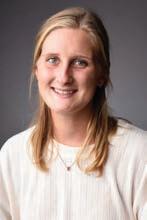
33 | 2022 GCSU HIGHLIGHTS































 Shelley Strickland Vice President for University Advancement
Winston Tripp Associate Dean Arts & Sciences
Angela Criscoe Executive Director School of Continuing and Professional Studies
Jennifer Graham Interim Chief Diversity Officer
Tanya Goette Associate Dean of the College of Business
Holley Roberts Associate Provost and Director of the Graduate School
Nicole DeClouette Interim Associate Dean in the College of Education
Shelley Strickland Vice President for University Advancement
Winston Tripp Associate Dean Arts & Sciences
Angela Criscoe Executive Director School of Continuing and Professional Studies
Jennifer Graham Interim Chief Diversity Officer
Tanya Goette Associate Dean of the College of Business
Holley Roberts Associate Provost and Director of the Graduate School
Nicole DeClouette Interim Associate Dean in the College of Education










































